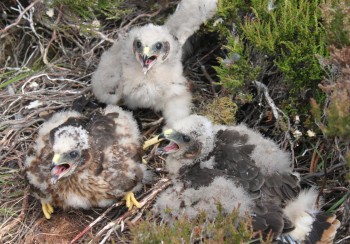Supporting guidance for Diversionary Feeding of Hen Harriers
Date published: 30 March, 2015
Diversionary feeding of hen harriers is a practical way of reducing conflict between hen harriers and red grouse management. Where harriers are fed, the number of grouse chicks taken is reduced particularly when harriers have young in the nest. The harriers that take diversionary food will still hunt for food that is naturally available, mainly voles and small birds.
Priority will be given to applications within a Hen Harrier Special Protection Area where red grouse management is carried out. Applications from other areas, particularly from south and east Scotland, will also be considered. This measure is not very relevant to the west highlands and islands.
What needs to be done

Harrier eggs hatch about 30 days after incubation has started. By observing birds from a distance you can tell when to start providing food. Females only return to the nest with food once chicks have hatched. Make one quick visit to the nest in good weather to count the number of chicks, and calculate how much food to provide. Most harrier nests hatch from late May to mid-June, although nests can hatch from mid-May through to late July depending on the timing of breeding. After hatching, chicks stay in the nest for about 35 days and in the general area for a further 25 days; so diversionary feeding needs to be for 60 days in total.
Establish feeding perches (a minimum of one per nest) around 100 metres from hen harrier nests and gradually move them closer, aiming for around 20 metres from the nest. Some birds may not tolerate the feeding perch being moved as close as 20 metres, so take care to avoid the birds abandoning the nest. Be aware harriers do mob intruders coming close to the nest and some can be quite aggressive.
Feed daily.
Place food on the perches early in the morning because harriers are most likely to take the substitute food in the early in the day and owls and foxes are likely to take it during the night.
If there is too much food to fit on top of the perch, further perches should be added.
All uneaten substitute food remaining from the previous day must be removed to reduce the threat of disease.
Keep time spent within 400 metres of the nest to a minimum, especially when the chicks are young and if the weather is cold wet or windy. Restocking feeding perches should take around 10 minutes.
Harriers may not take food immediately, and it can take several days before they do. It is important to keep providing food even if they do not appear interested initially.
Stop feeding after 60 days, when adult harriers have left the area, when nests fail or when scavengers are taking a reasonable proportion of the diversionary feed.
Hen harriers are specially protected birds under the Wildlife and Countryside Act 1981 and you need a licence to undertake this measure because you have to go close to the nest. Your application for funding will be considered by Scottish Natural Heritage as your licence application.
What food to use
Use commercially bought poultry chicks and white rats as substitute food. They are usually supplied frozen in boxes that fit into a deep freeze. A one day-old poultry chick weighs approximately 40g and a small rat weighs around 160g, though these figures will vary depending on the supplier. Defrost the required amount the night before use.
Do not use locally available food items such as cu- up chunks of rabbit or rats, as the they can carry a risk of lead poisoning if shot and secondary poisoning if the rats have been killed with rodenticide. It is illegal to provide live food.
Feeding requirements
The daily food requirement changes as the chicks grow. Hen harrier nests usually contain three to five chicks.
| Age of harrier chicks | Daily food requirement per chick | Daily requirement using poultry chicks for a brood of three harrier chicks | Daily requirement using dead rats for a brood of three harrier chicks |
| 1 week | 40g | 3 | 1 |
| 2 weeks | 70g | 6 | 2 |
| 3 weeks | 140g | 11 | 3 |
| 4 weeks | 155g | 12 | 3 |
| 5 weeks | 185g | 14 | 4 |
| Remaining 25 days | 185g | 14 | 5 |
